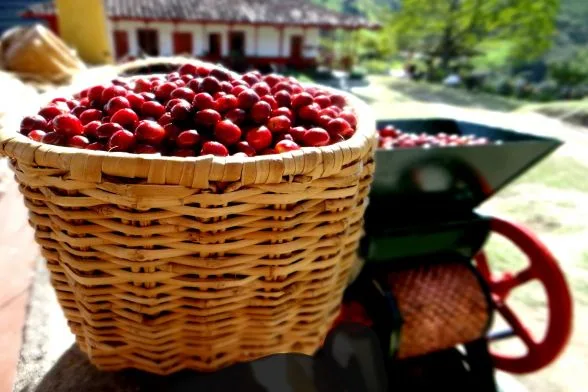Food security, infrastructure and connectivity are, among others, the axes on which the lawyer, Sandra Morelli Rico, would base her work plan if she was chosen as the first female manager of the National Federation of Coffee Growers. She exclusively spoke with Diario del Huila about her proposals.
Newspaper of Huila, Close-up
By: Gloria Camargo
Sandra Morelli Rico, a lawyer and a native of Bogotá, in addition to being the only woman on the shortlist for the General Management of the National Federation of Coffee Growers, seeks to be the first to reach the position, which has historically been led by men since 1927.
In an exclusive interview for Diario del Huila, Morelli Rico indicated that before establishing his proposals, which have already been presented to this day by the shortlist before the Departmental Committees of Caldas, Risaralda, Quindío, Valle del Cauca, Norte from Santander, Santander and Cauca (the meeting is taking place today), these were based on a prior analysis of the coffee grower union.
According to the lawyer, in Colombia, including Huila, there are challenges regarding poverty rates, food security, production costs, connectivity and infrastructure.
It also seeks to achieve a reduction in poverty, since it indicates that 77% of coffee growers are in Sisben. And that in order to get out of poverty, one must return to the most technologically advanced home garden, which, in addition to supplying the domestic market, allows income from the sale of surpluses in peasant markets, as well as access with systematic and individualized support to programs such as Mi Casa Ya, Families in Action and pension.
The shortlist also refers to the high costs of fertilizers, which it intends to reduce through a policy of purchasing in large volumes to lower costs, added to an association of properties to achieve savings and synergies in payments for public services and energy adoption. alternatives, use of mill, transportation, among others.
Morelli is a graduate of the Externado University, where she graduated with honors, she has postgraduate studies in administrative law and administration science at the University of Bologna, Italy, with brief stays at the Sorbonne in Paris (as a fellow) and at the University from Yale, USA.
She has been a professor and researcher, founding partner and legal representative of Morelli Abogados. In her work experience, public positions stand out as Comptroller General of the Republic between 2010 and 2014, being the first woman in this position, she was also legal director of the National Federation of Coffee Growers in 1998.
On what did you base your proposal plan to present it to the Steering Committees of the producing departments?
To make proposals one has to identify the main problems. The union has some very big challenges in terms of poverty rates for Colombian coffee farmers and producers. Likewise, there is a problem of cost overruns in coffee production, we also have the need to review the structure of the central office and finally we have to look at the connectivity problem, both through physical infrastructure and the issue of Internet access for achieve specific goals.
What is proposed in regards to poverty rates?
On the subject of poverty, we are talking about 77% of the population affiliated with Sisbén, which means that we have a serious poverty problem for the coffee-growing peasant population. To face this problem, we must take advantage of the fact that we are in a unique situation in the country, which It is a government that makes a very ambitious social offer. The first is the pension issue, coffee farmers do not have enough income to make their pension savings, much less if they are independent workers or owners of their plot, which 96% is less than one hectare. In the pension reform, a pension scheme is foreseen where there would be no contribution and the pension could be assumed by the State. Contributing to this, with all aspects of institutional management, we have to organize a massive program for the affiliation of coffee-growing peasants to this initiative.
You also referred to the problem of food security, how would the gap be closed?
There is also a food problem, and it is that there is a too high percentage of coffee-producing peasants who have or live in a precarious situation of food and nutrition, it is even very large who eat only once a day. The Federation has extensive experience in the home garden program where the farmer is given a kit with chickens, seeds and fertilizers so that he can sow it and not only feed his family in a balanced way but can even sell it in farmers’ markets. The idea is to strengthen this plan with technology, training and even with monetary resources, but also to establish obligatory goals because it also happens that the kits are delivered and it is not sown, it is not used or it is not done according to the technical instructions. and a great opportunity to create a minimum of food security for the peasant population is wasted.

What is proposed with the issue of production costs?
A massive plan for the purchase of fertilizers is being proposed, although at the national level they are simple, not compound, and then mix them according to the needs of the land to grow coffee beans, according to what Cenicafé indicates. But we also have the possibility of seeing the importation of fertilizers, even not only for the coffee-growing peasant sector, but also for other agricultural sectors. Between 10 and 20% of the cost structure of coffee production has to do with the cost of fertilizers, and it is essential because thanks to good fertilization, the quantity can be increased and the quality of the harvest improved.
In the department of Huila, what would be the actions to develop?
Much of the issue in Huila has to do with a percentage of small lands or minifundistas, where it is very important to strengthen land associative schemes in order to produce economies of scale and achieve synergy in the costs of services, costs of marketing and mills. In Huila we have a very important asset, which is the quality of the coffee, and to the extent that we take great care in drying and processing, we can continue intensifying this value-added strategy to have a premium for the peasant producer, precisely in consideration of differentiated own brands, quality seals and organic crops. That is a great strength of Huila that we have to continue strengthening to maximize the income of the Huila producer.
Finally, you were the only woman on the list to choose the shortlist, and later in the shortlist, how would female participation in the FNC expand under your management?
We have to establish a norm in the quota statutes that can oscillate between 30 and 50% of women in the municipal representative bodies, Departmental Committee and National Committee. Clearly, the collaboration of all the other members of the family is required, especially the coffee family, where men guarantee the participation of women in the representation and that they can assume roles that women ordinarily do.
